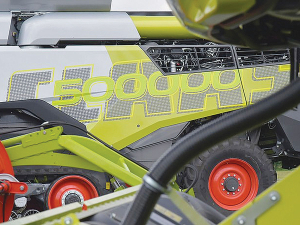Claas is celebrating half a million combine harvesters built since 1936, marking the occasion by building anniversary machines from the Lexion, Trion, Evion and Dominator families at three locations on three continents.
Claas has been a key pacesetter in combine harvester development from 1936 onwards, the Harsewinkel-based family company rationalising grain harvesting in Europe with the mowing- threshing-binder with the M.D.B, in 1946 with the arrival of the SUPER series, which from 1953 could also be delivered with add-on engines.
In 1953, the company successfully entered the self-propelled combine harvester segment with names like Hercules, Matador, Senator and Mercator. In 1972, the Dominator consolidated its status as the European market leader with the Dominator 6 and Dominator 8 series, alongside innovations such as 3D cleaning, auto contour header guidance and the Mega threshing unit.
In 1995, the Lexion 480 launched with APS hybrid technology and proved to be a game changer in terms of performance, comfort and electronic applications for the emerging precision farming era. Since 1997, the ground-protecting Terra Trac chassis technology on the Lexion and for the Trion since 2021, has established the use of rubber tracks.
With around 100,000 and over 75,000 units respectively, Dominator and Lexion account for the largest share of the 500,000 combine harvesters built to date. Meanwhile Super and Super Automatic (approx. 65,000 units) as well as Europa and Columbus (together approx. 60,000 units) and the Tucano (approx. 35,000 units) also contributed significant numbers to the global success.
Over the decades, Claas has also supplied other manufacturers with combine harvesters. Since 1992, the first Claas Crop Tiger rolled off the assembly line in India, of which more than 10,000 units have been produced. Since 2001, Claas has also been producing Lexion hybrid combine harvesters for the North American market in its own factory in Omaha, Nebraska.
Since 2013, Claas has also produced combine harvesters and components in China, with a Dominator 370 hybrid introduced in 2019, followed by the Dominator 260, with six walkers, in 2022. At Törökszentmiklós in Hungary, a dedicated facility has been producing cutters and corn pickers for Claas combine harvesters since 1997, with the 100,000th cutting unit leaving the factory in 2021.
With 500,000 units produced over 88 years, the anniversary will be marked with a limited number of Evion, Trion and Lexion models built with a special paint finish and extensive decals. The design is a homage to the combine product history, with the silver metallic colour representing harvester production from 1936 up to 1961.



















